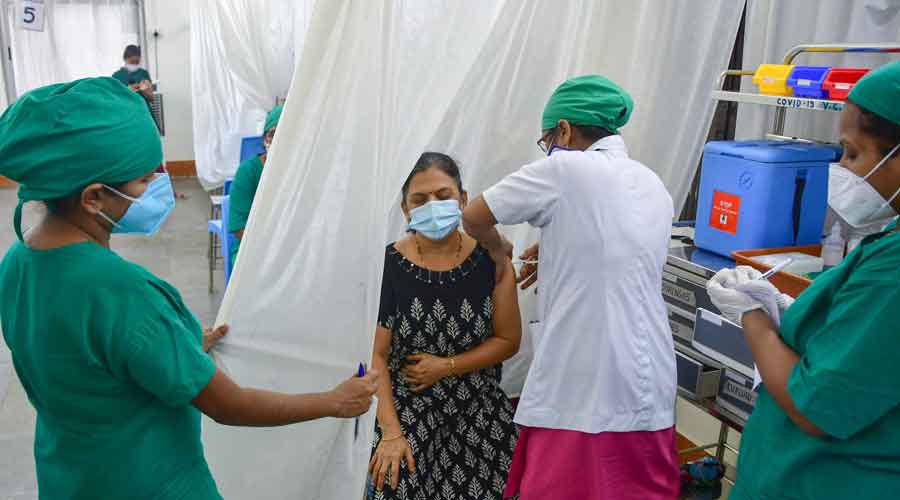
Vaccine priority leeway for states under revised policy
Union health ministry's guidelines also call on states to ensure equitable distribution of jabs across private hospitals and underserved geographic regions

The Union health ministry on Tuesday released revised guidelines that also call on states to ensure equitable distribution of vaccines across large and small private hospitals and underserved geographic regions to curb large private hospitals from gobbling up disproportionate shares of doses.
Under the revised policy, announced by Prime Minister Narendra Modi on Monday, the Centre will procure 75 per cent of Covid-19 vaccines produced in India and distribute them free to states for all adults 18 years or older. The balance 25 per cent doses will be reserved for private hospitals.
The Centre’s 75 per cent doses will be free to anyone above 18 years of age, but those wishing to get vaccinated in private hospitals would need to pay Rs 780 for Covishield, Rs 1,410 for Covaxin and Rs 1,145 for Sputnik. These price tags include a cap of Rs 150 the hospitals can charge for the service.
The changes will end the current policy introduced on May 1 under which the Centre procures 50 per cent doses and expects states and private hospitals to buy the other half, leading to a scramble for doses between states and private hospitals.
A senior health official said the revised policy would introduce flexibility for people and states, allowing people to register via the Co-WIN digital platform or register on-site in either government or private hospitals. At present, those under 45 years have to pre-register only on Co-WIN.
Sections of health experts had pointed out that making pre-registration via Co-WIN had introduced elements of inequity into the campaign by denying opportunities for those between 18 and 45 years who had no access to the digital platform.
Many have also complained in recent days that they are unable to find slots on the Co-WIN digital platform.
The revised guidelines allow states to decide their own prioritisation within the 18-to-45-years age group depending on vaccine supplies available. A state could, for instance, decide that people in the 18 to 45 age group in certain occupations at high risk of infection exposure such as hotel or restaurant staff or vegetable vendors would have priority over others in that age group,” a public health expert said.
The guidelines also require states to “aggregate the demand of private hospitals with a view to achieve equitable distribution”.
The states have been asked to ensure that vaccines are distributed evenly across large and small hospitals apart from government facilities across geographies, a health official said.
The Centre, based on this aggregated demand, will facilitate supply of vaccines to the private hospitals and their payment through the National Health Authority’s electronic platform, the ministry said.
“This would enable smaller and remote private hospitals to obtain timely supply of vaccines,” the health ministry said, amid concerns that over the past four weeks a few large hospital chains have procured disproportionate shares of vaccines available for the private sector.
Health experts have welcomed the change, saying centralised vaccine procurement will help the government negotiate better prices.
“This will stop competition between states and allow them to focus on vaccine distribution,” said Poonam Muttreja, executive director of the Population Foundation of India, a health non-government organisation.
But others caution that vaccine supplies in the immediate future appear limited and will pose challenges to accelerate the pace of the vaccination campaign. “We expect this policy will expand the basket of vaccines for India,” said Giridhar Babu, professor of epidemiology at the Indian Institute of Public Health, Bangalore.
But Babu cautioned that more vaccines and on-site registration would not be enough to address inequities in access. “This assumption is not correct,” he said. “Many people across the country do not show health-seeking behaviour that will get them to seek out vaccinations. They need to be motivated.”
440 million doses ordered
The Centre has ordered 250 million doses of Covishield and 190 million doses of Covaxin, Vinod Paul, member of the Niti Aayog and chair of the national expert panel on Covid-19 vaccination, said on Tuesday, announcing procurements planned starting in August.
Paul said the Centre expected to have distributed 536 million doses up to July 2021 and the additional 440 million Covishield and Covaxin doses were intended to arrive between August and December. In addition, the government also expects 300 million doses of a new vaccine from the Hyderabad-based Biological E.
Officials have said India hopes to vaccinate all eligible adults — an estimated 950 million people — by December this year by accelerating the vaccination campaign with these domestic doses as well as imported vaccines from companies such as Pfizer and Johnson & Johnson when they become available.
The Centre has said it is distributing doses among states based on population, Covid-19 disease burden, vaccine coverage and wastage.

0 Response to "Vaccine priority leeway for states under revised policy"
Post a Comment
Disclaimer Note:
The views expressed in the articles published here are solely those of the author and do not necessarily reflect the official policy, position, or perspective of Kalimpong News or KalimNews. Kalimpong News and KalimNews disclaim all liability for the published or posted articles, news, and information and assume no responsibility for the accuracy or validity of the content.
Kalimpong News is a non-profit online news platform managed by KalimNews and operated under the Kalimpong Press Club.
Comment Policy:
We encourage respectful and constructive discussions. Please ensure decency while commenting and register with your email ID to participate.
Note: only a member of this blog may post a comment.